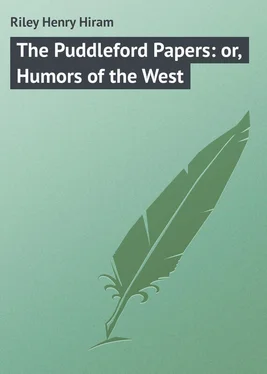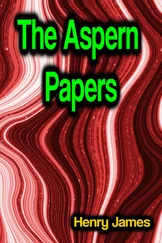Henry Riley - The Puddleford Papers - or, Humors of the West
Здесь есть возможность читать онлайн «Henry Riley - The Puddleford Papers - or, Humors of the West» — ознакомительный отрывок электронной книги совершенно бесплатно, а после прочтения отрывка купить полную версию. В некоторых случаях можно слушать аудио, скачать через торрент в формате fb2 и присутствует краткое содержание. Жанр: foreign_prose, foreign_humor, на английском языке. Описание произведения, (предисловие) а так же отзывы посетителей доступны на портале библиотеки ЛибКат.
- Название:The Puddleford Papers: or, Humors of the West
- Автор:
- Жанр:
- Год:неизвестен
- ISBN:нет данных
- Рейтинг книги:3 / 5. Голосов: 1
-
Избранное:Добавить в избранное
- Отзывы:
-
Ваша оценка:
- 60
- 1
- 2
- 3
- 4
- 5
The Puddleford Papers: or, Humors of the West: краткое содержание, описание и аннотация
Предлагаем к чтению аннотацию, описание, краткое содержание или предисловие (зависит от того, что написал сам автор книги «The Puddleford Papers: or, Humors of the West»). Если вы не нашли необходимую информацию о книге — напишите в комментариях, мы постараемся отыскать её.
The Puddleford Papers: or, Humors of the West — читать онлайн ознакомительный отрывок
Ниже представлен текст книги, разбитый по страницам. Система сохранения места последней прочитанной страницы, позволяет с удобством читать онлайн бесплатно книгу «The Puddleford Papers: or, Humors of the West», без необходимости каждый раз заново искать на чём Вы остановились. Поставьте закладку, и сможете в любой момент перейти на страницу, на которой закончили чтение.
Интервал:
Закладка:
Jim Buzzard was a fisher, too, and nothing but a fisher. He would sit on an old log by the bank of the river, and hold a pole from morning until night. If the fish would bite, very well; if they would not, very well. Ill-luck never roused his wrath, because there was no wrath in him to arouse. He was a true philosopher, and was entirely too lazy to get into a passion. Jim knew that the fish would bite to-morrow, or next day, if they didn't to-day. He was happy, completely so; that is, as completely happy as the world will admit. He didn't envy anybody – not he. All his wants were supplied, and what did he care about the possessions of his neighbors? He never realized any future, here or hereafter. Jim never lay awake nights, thinking about where he would be, or what he should have, next week. He didn't know as there was any next week. He knew the sun rose and set, which was all the time he ever measured at once. Well, as I said, Jim made one of our company.
Our boat was finally loaded, our crew shipped, and we shot forth into the stream. The water lay as smooth as glass, and the reflected colors of the blazing trees that hung over it gave it the appearance of a carpet. The headlands put out here and there, intersected by long gores of marsh, that ran away a mile or more in the distance.
Upon one of these marshes a city had been reared by the muskrats, which presented an interesting appearance. Hundreds of huts had been erected by this busy population, intended by them as their winter quarters, composed of grass and sticks and mud, and hoisted up beyond the reach of the spring floods. Each one was a little palace, and the whole sat upon the water like a miniature Venice. Here huts were entered by diving down, the front door being always concealed to prevent intrusion. Up and down the canals of this city the inhabitants gossiped and gambolled by moonlight, like those of every other gay place. They had their routs, and cotillons, and suppers, in all human probability, and for aught I know drank themselves stupid. Perhaps they kept up an opera. I say perhaps – we know so little of the inner life of these strange creatures, that we may draw upon the imagination in regard to their amusements as much as we please. If any transcendental muskrat should ever write the history of this colony, I will forward it to the newspapers by the first mail.
Venison said, "we were going to have a wet time on't, cause the rats had built so high, and the whole mash would be covered bime-by, by the rains." He said, "muskrats know'd more nor men about times ahead, and fixed up things 'cordingly."
Our boat glided along until we came in sight of a huge bluff that had pushed itself half across the stream. A melancholy fragment of one of the tribes of Indians, who once held the sovereignty of the soil, and who had escaped a removal, or had wandered back from their banishment, were clustered upon it. They had erected a long pole, and gathered themselves, hand in hand, in a circle about it; within this circle, their medicines and apparel worn in worship, lay for consecration. The plaintive chant was heard melting along the waters, as they wheeled round and round in their solemn service. I have never looked upon a more touching exhibition. Most of these Indians were very old; they had outlived their tribe, their country, their glory – everything but their ceremonies and themselves. What a beautiful tribute was this to the past! a handful of worshippers lingering round the broken altar of their temple, and hallowing its very ruins.
Near by, and on the southern slope of the bluff, lay the remains of an extensive Indian burying-ground. No white man could tell its age. Large oaks, centuries old, that had grown since the dead were first deposited there, stood up over the graves. No monuments of stone designated the thousands of sleepers – the living themselves were the monuments of the dead. Weapons of war and peace were scattered beneath the turf, mixed with crumbling human bones.
What were this little band of red men, thought I, but so many autumn leaves? A few years more, and the solitary boat, as it turns this headland, will find no warrior kneeling on its height. The Great Spirit will brood alone over the solitude.
By and by, we turned into a bay, sheltered by an overhanging cliff, where we cast our anchor, and made ready for work. The water was transparent, and the shining pebbles glittered in the sandy depths below. Shoals of fish had gathered in this nook, beyond the strife of waters. The sun-fish, his back all bristling with rage, ploughed around with as much ferocity as a privateer; the checkered perch lazily rolled from side to side, as his breath came and went; the little silver dace darted and flashed through each other their streams of light; and away off, all alone, the pickerel, that terror of the pool, stood as still and dart-like as the vane of a steeple.
This congregation reminded me of the stir we sometimes find in the ports of a city. They seemed to have much business on hand. They were continually putting out and putting in; sometimes alone and sometimes in fleets. I noticed an indolent old "sucker," who made several unsuccessful attempts to reach the current, and get under headway. Once in a while, a fish would come dashing in from above, like a ship before a gale, throwing the whole community into an uproar.
Below us, on the left bank of the river, stretched a prairie which was several miles in circumference. It was dotted, here and there, with a settler's cabin, but the greater part yet lay in the wild luxuriance of nature. It was surrounded by the forest, and long points of woodland pierced it, now glowing like a flame. Shooting back and forth, the prairie-hens sailed across it like boats upon the main. The sky above it was filled with hawks, sweeping round and round in search of prey – now they rested upon their outspread wings – then plunged through a long-drawn curve – then gracefully moved near the earth in downward circles, as some object was discovered, winnowing a while above it, to make sure of its nature and position, and rising once more, and turning with lightning quickness, away they rushed upon their quarry, and soared away with it on high.
In the depth of winter, when the lakes and rivers are bound in ice, vast bodies of geese assemble there. Acres of ground are covered, and they storm about their camp like an army of soldiers. Some commanding elevation, far out from shore, beyond the reach of the hunter's gun, is selected. When disturbed, their sentinels blow the alarm, and away they go, piping their dismal dirge, until it dies afar in the sky. By daybreak the next morning, they are on the ground again, as tranquil as though nothing had happened.
It is almost impossible to trap these wanderers. Before they establish their quarters, they study the landscape with the eye of a painter. They take a daguerrian view of objects as they are. The log-hut, with its curling smoke – the hay-stack crowned with snow – the settler's cart tipped up, its tongue pointing towards the north star – a goose understands as well as a man. They never blow up nor work destruction. But just try an artificial house of boughs, a brush fence, or an intrenchment near their lines. They see the plot at a glance, and draw out of harm's way, and pitch their snowy tents again, beyond its reach. As well chase the fabled island as a flock of wild geese.
Not far below this prairie, near the bank of the river, a venerable mound raised its solitary head. It was thinly covered with oaks, and belonged to Oblivion. It was one of the few feathers that Time had cast in his flight, to mark the past and confuse the present. It looked like a hand reached out from eternity; but whose hand? Ay, whose? Who built it? When? Why? It was filled with all kinds of strange things that had been planted there by a busy race who were unable to preserve their own history. Their works had outlived themselves; but they cannot talk to us, nor tell us what they are, nor who fashioned them. There it stands, gazing dumbly at all who look upon it, a sad lesson to individual pride or national glory.
Читать дальшеИнтервал:
Закладка:
Похожие книги на «The Puddleford Papers: or, Humors of the West»
Представляем Вашему вниманию похожие книги на «The Puddleford Papers: or, Humors of the West» списком для выбора. Мы отобрали схожую по названию и смыслу литературу в надежде предоставить читателям больше вариантов отыскать новые, интересные, ещё непрочитанные произведения.
Обсуждение, отзывы о книге «The Puddleford Papers: or, Humors of the West» и просто собственные мнения читателей. Оставьте ваши комментарии, напишите, что Вы думаете о произведении, его смысле или главных героях. Укажите что конкретно понравилось, а что нет, и почему Вы так считаете.












![O. Henry - Heart of the West [Annotated]](/books/745888/o-henry-heart-of-the-west-annotated-thumb.webp)